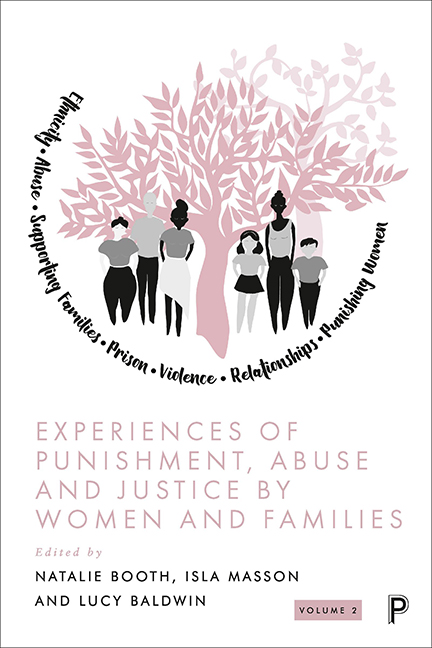Book contents
- Frontmatter
- Contents
- Notes on contributors
- Acknowledgements
- Foreword: time to shift the focus and reduce the use of the penal system for women
- 1 Keeping the conversation going: the Women, Family, Crime and Justice network
- Part I Punishing women in the criminal justice system
- Part II Violence, abuse and justice
- Index
2 - Pregnancy and new motherhood in prison during the COVID-19 pandemic
Published online by Cambridge University Press: 18 January 2024
- Frontmatter
- Contents
- Notes on contributors
- Acknowledgements
- Foreword: time to shift the focus and reduce the use of the penal system for women
- 1 Keeping the conversation going: the Women, Family, Crime and Justice network
- Part I Punishing women in the criminal justice system
- Part II Violence, abuse and justice
- Index
Summary
Introduction
The prison population of women in England is approximately 3,600 (Ministry of Justice [MoJ], 2021a). Women in prison are reported to have many complex issues which include enduring childhood trauma, disadvantage, homelessness, domestic violence and resultant misuse of illegal substances (Corston, 2007; Baldwin, 2015). Approximately 66 per cent of women in prison are mothers (Beresford et al, 2020; Baldwin, 2021). It is estimated that there are approximately 600 pregnancies and 100 births per year (Kennedy et al, 2016; Abbott, 2018). Of the 12 women’s prisons in England and Wales six have Mother and Baby Units (MBU), with 64 MBU places available nationally (MoJ, 2021b). It is understood that around 50 per cent of babies will remain with their mothers and 50 per cent will be placed outside of prison with family or foster carers (Kennedy et al, 2016). The process of applying for an MBU place usually involves a range of multi-agency assessments, culminating in an MBU ‘board’ where a mother attends to give evidence of why she should be guaranteed a place with her baby.
There has been policy interest in women in prison and specifically pregnant women and mothers recently, including a new position paper published by the Royal College of Midwives (RCM, 2019) which outlines best practice for working with expectant women in prison. Following this, the MoJ (2020) published a ‘Review of operational policy on pregnancy, mother and baby units and maternal separation’ where additional and specific guidance around pregnancy, birth, separation and staff training was issued. Tragic deaths of two babies born to imprisoned mothers also led to investigations being launched. Findings from the first investigation found considerable concerns about the care and management of the baby’s mother with a significant number of recommendations to improve maternity services (Prisons and Probation Ombudsman, 2021). It is likely further guidance will be provided, particularly in relation to the care of pregnant mothers who are not yet placed within an MBU space. Nevertheless, and despite this increased policy attention, there remain concerns about the welfare and support for this population, especially during the COVID-19 pandemic.
- Type
- Chapter
- Information
- Experiences of Punishment, Abuse and Justice by Women and FamiliesVolume 2, pp. 11 - 31Publisher: Bristol University PressPrint publication year: 2023



